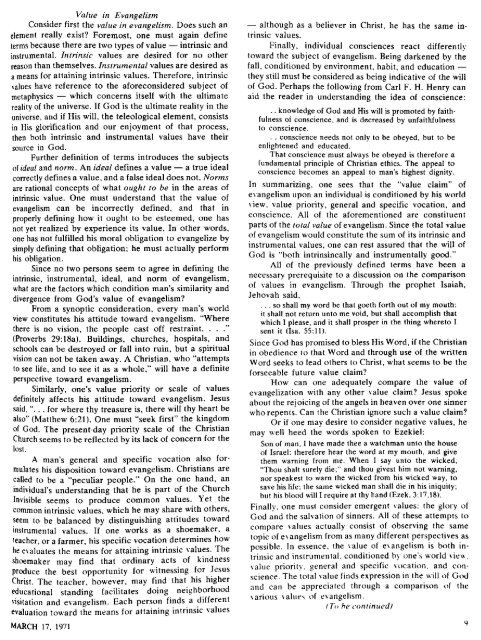Covenanter Witness Vol. 86 - Rparchives.org
Covenanter Witness Vol. 86 - Rparchives.org
Covenanter Witness Vol. 86 - Rparchives.org
You also want an ePaper? Increase the reach of your titles
YUMPU automatically turns print PDFs into web optimized ePapers that Google loves.
Value in EvangelismConsider first the value in evangelism. Does such anelement really exist? Foremost, one must again defineterms because there are two types of value — intrinsic andinstrumental. Intrinsic values are desired for no otherreason than themselves. Instrumental values are desired asa means for attaining intrinsic values. Therefore, intrinsicvalues have reference to the aforeconsidered subject ofmetaphysics — which concerns itself with the ultimatereality of the universe. If God is the ultimate reality in theuniverse, and if His will, the teleological element, consistsin His glorification and our enjoyment of that process,then both intrinsic and instrumental values have theirsource in God.Further definition of terms introduces the subjectsol ideal and norm. An ideal defines a value — a true idealcorrectly defines a value, and a false ideal does not. Normsare rational concepts of what ought to be in the areas ofintrinsic value. One must understand that the value ofevangelism can be incorrectly defined, and that inproperly defining how it ought to be esteemed, one hasnot yet realized by experience its value. In other words,one has not fulfilled his moral obligation to evangelize bysimply defining that obligation; he must actually performhis obligation.Since no two persons seem to agree in defining theintrinsic, instrumental, ideal, and norm of evangelism,what are the factors which condition man's similarity anddivergence from God's value of evangelism?From a synoptic consideration, every man's worldview constitutes his attitude toward evangelism. "Wherethere is no vision, the people cast off restraint. . . ."(Proverbs 29:18a). Buildings, churches, hospitals, andschools can be destroyed or fall into ruin, but a spiritualvision can not be taken away. A Christian, who "attemptsto see life, and to see it as a whole," will have a definiteperspective toward evangelism.Similarly, one's value priority or scale of valuesdefinitely affects his attitude toward evangelism. Jesussaid, ". . . for where thy treasure is, there will thy heart bealso" (Matthew 6:21). One must "seek first" the kingdomof God. The present-day priority scale of the ChristianChurch seems to be reflected by its lack of concern for thelost.A man's general and specific vocation also formulateshis disposition toward evangelism. Christians arecalled to be a "peculiar people." On the one hand, anindividual's understanding that he is part of the ChurchInvisible seems to produce common values. Yet thecommon intrinsic values, which he may share with others,seem to be balanced by distinguishing attitudes towardinstrumental values. If one works as a shoemaker, ateacher, or a farmer, his specific vocation determines howhe evaluates the means for attaining intrinsic values. Theshoemaker may find that ordinary acts of kindnessproduce the best opportunity for witnessing for JesusChrist. The teacher, however, may find that his highereducational standing facilitates doing neighborhoodvisitation and evangelism. Each person finds a differentevaluation toward the means for attaining intrinsic values— although as a believer in Christ, he has the same intrinsicvalues.Finally, individual consciences react differentlytoward the subject of evangelism. Being darkened by thefall, conditioned by environment, habit, and education —they still must be considered as being indicative of the willof God. Perhaps the following from Carl F. H. Henry canaid the reader in understanding the idea of conscience:.. knowledge of God and His will is promoted by faithfulnessof conscience, and is decreased by unfaithfulnessto conscience.. . conscience needs not only to be obeyed, but to beenlightened and educated.That conscience must always be obeyed is therefore afundamental principle of Christian ethics. The appeal toconscience becomes an appeal to man's highest dignity.In summarizing, one sees that the "value claim" ofevangelism upon an individual is conditioned by his worldview, value priority, general and specific vocation, andconscience. All of the aforementioned are constituentparts of the total value of evangelism. Since the total valueof evangelism would constitute the sum of its intrinsic andinstrumental values, one can rest assured that the will ofGod is "both intrinsincally and instrumentally good."All of the previously defined terms have been anecessary prerequisite to a discussion on the comparisonof values in evangelism. Through the prophet Isaiah,Jehovah said,... so shall my word be that goeth forth out of my mouth:it shall not return unto me void, but shall accomplish thatwhich I please, andit shall prosper in the thing whereto Isentit (Isa. 55:11).Since God has promised to bless His Word, if the Christianin obedience to that Word and through use of the writtenWord seeks to lead others to Christ, what seems to be theforseeable future value claim?How can one adequately compare the value ofevangelization with any other value claim? Jesus spokeabout the rejoicing of the angels in heaven over one sinnerwho repents. Can the Christian ignore such a value claim?Or if one may desire to consider negative values, hemay well heed the words spoken to Ezekiel:Son of man, I have made thee a watchman unto the houseof Israel: therefore hear the word at my mouth, and givethem warning from me. When I say unto the wicked,"Thou shalt surely die;" and thou givest him not warning,nor speakest to warn the wicked from his wicked way, tosave his life; the same wicked man shall die in his iniquity;but his blood will I require at thy hand (Ezek. 3:17,18).Finally, one must consider emergent values: the glory ofGod and the salvation of sinners. All of these attempts tocompare values actually consist of observing the sametopic of evangelism from as many different perspectives aspossible. In essence, the value of evangelism is both intrinsicand instrumental, conditioned by one's world view,value priority, general and specific vocation, and conscience.The total value finds expression in the will of Godand can be appreciated through a comparison of thevarious values of evangelism.I To he continued)MARCH 17, 1971 9
















